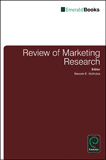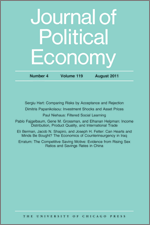Academic articles
Practitioner articles
Working papers
Books
Book chapters
Case studies
Other publications
Subject(s)
Human resources management/organizational behavior
Keyword(s)
Status, US venture capital industry
This article introduces a distinction between two kinds of status and investigates their effects empirically on the life chances of U.S. venture capital organizations. Using recent research on status-based competition as our starting point, we first describe primary status as a network-related signal of an organization’s quality in a leadership role, and measure primary status as the degree to which a focal organization leads others that are themselves well regarded as lead-organizations in the context of investment syndicates. We then introduce complementary status as an affiliation-based indicator of an organization’s quality in a supporting role, measuring complementary status as the extent to which a focal organization is invited into syndicates by well-regarded lead-organizations—that is, by organizations possessing high levels of primary status. Findings show that both kinds of status negatively affect the rate at which venture capital organizations exit the industry. In addition, consistent with the proposition that primary status and complementary status correspond to distinct market roles and different market identities, primary status and complementary status attenuate each other’s favorable main effects on survival for dedicated venture capital organizations. Theoretically and methodologically oriented scope conditions as well as implications for future research are discussed.
With permission of Elsevier
Volume
52
Journal Pages
588–601
Subject(s)
Ethics and social responsibility; Marketing
Keyword(s)
Attachment, identification, social identity, consumer-brand relationships, brand loyalty
We examine two conceptualizations of consumer-brand relationships: identification, as identity-based relationships between a consumer and a brand, and the related construct of attachment as a bond based on security and personal history with the brand.Predictions emanating from the two constructs’ disparate theoretical traditions regarding the relative antecedents and outcomes of these brand relationship constructs are tested in a survey of real consumer-brand relationships, where the two are likely to co-occur. Identification is more socially motivated, wherein the brand is used for “identity building” and impression management, such as through public endorsement. In contrast, attachment is more personally motivated; it is more likely to be founded on an intimate history with the brand and feelings of security inspired by the brand. This is the first work in marketing to explicitly compare identification with attachment in contexts where they co-occur. In doing so, it underscores the validity and usefulness of these two related but distinct relationship constructs.
With permission of Emerald
Volume
12
Journal Pages
151–174
Subject(s)
Technology, R&D management
Keyword(s)
social networks
Volume
93
Journal Pages
1687–1722
Subject(s)
Ethics and social responsibility
Keyword(s)
Production ethics, international ethics, transparency, workplace exploitation, supply chain sustainability, social responsibility
This is an abridged version of the case Axel Springer and the quest for the boundaries of corporate responsibility. The case deals with the quest for boundaries of corporates’ social and environmental responsibility. It poses the question where the responsibility of a company might start or end in a given context and once the company has been able to assess the extent to which it holds itself responsible, what action it ought to take in this regard. In the case of Axel Springer the question is focused on the aspect how much responsibility the company might have for its supply chain: how far and how deep down the supply chain does or should responsibility of a corporation reach? On what facts does this responsibility depend? The publishing house Axel Springer AG serves as good example as it wonders about the scope of their responsibility: After making the strategic decision to move aggressively into the field of digital news and media, the company wonders about their responsibility for digital devices, in particular with respect to conflict minerals that are extracted for the production and use of such electronic devices under highly problematic conditions.
The case draws attention to a rather ambiguous, quite complex, and intertwined sustainability issue. It requires students to think laterally about anticipated and potential risks, about scopes and the extent of responsibility. The case can be well-introduced at a later and more advanced stage of the term as it deals with the concerns of an only indirectly involved media and publishing house that can either neglect or take up the challenge of dealing with conflict minerals. Students preferably know concepts of risk management and corporate responsibility or are acquainted with cases focusing on formulating, implementing, or articulating corporate responsibility before dealing with the question of at what stage and with what tier of the supply chain could or should corporate responsibility end.
| buy now | buy now |
Subject(s)
Economics, politics and business environment; Ethics and social responsibility
Keyword(s)
Negotiation, distributive negotiation, integrative negotiation, European cross-border infrastructure projects, implications on management of permitting and communication, different approaches to negotiations
Secondary Title
Project management
Edition
9th ed.,
Pages
108–110
ISBN
978-1-118-94583-4
Subject(s)
Information technology and systems; Marketing
Keyword(s)
ROI, CRM, benefits realization, performance improvement, social media, big data
Marketing practice is increasingly shaped through the application of new technology, including customer relationship marketing (CRM) software, social media, analytics and search, with organisations investing heavily in these technologies. Yet, surprisingly, research by marketing scholars continues to question the profitability of IT-led marketing initiatives. If this is true, why do companies continue to make such investments? To explore this question, we examined research that has looked at the return on investments in IT-led marketing change. Analysing the findings of leading studies of the impact of CRM spend on financial and market performance, we suggest that marketing scholars make untested assumptions as to how expected payoffs are realized and thus generate incommensurate conclusions. Moreover, we found that marketing scholars adopt a very limited epistemology that is unsuited to the nature of the phenomenon being studied. For comparison, we explore how similar phenomena are studied by the information systems discipline. We conclude with implications for both marketing practice and research.
With permission of Emerald
Volume
49
Journal Pages
561–595
Subject(s)
Economics, politics and business environment
Secondary Title
Handbuch Sicherheitsgefahren
Pages
229–238
ISBN
978-3-658-02752-0
Subject(s)
Marketing
© 2014 Product Development & Management Association
Volume
32
Journal Pages
424–440
Subject(s)
Economics, politics and business environment
Keyword(s)
Social interactions, identification, incomplete information games
JEL Code(s)
C21, C23, C31, C35, C72, Z13
This paper provides a systematic analysis of identification in linear social interactions models. This is both a theoretical and an econometric exercise as the analysis is linked to a rigorously delineated model of interdependent decisions. We develop an incomplete information game that describes individual choices in the presence of social interactions. The equilibrium strategy profiles are linear. Standard models in the empirical social interactions literature are shown to be exact or approximate special cases of our general framework, which in turn provides a basis for understanding the microeconomic foundations of those models. We consider identification of both endogenous (peer) and contextual social effects under alternative assumptions on a priori information about network structure available to an analyst, and contrast the informational content of individual-level and aggregated data. Finally, we discuss potential ramifications for identification of endogenous group selection and differences between the information sets of analysts and agents.
With permission of the University of Chicago Press
Volume
123
Journal Pages
444–496
Subject(s)
Marketing
Keyword(s)
Goals, product evaluation, positive mood
Negotiating the pursuit of multiple goals often requires making difficult trade-offs between goals. In these situations, consumers can benefit from using products that help them pursue several goals at the same time. But do consumers always prefer these multipurpose products? We propose that consumers’ incidental mood state alters perceptions of products in a multiple-goals context. Four studies demonstrate that being in a positive mood amplifies perceptions of differences between multiple conflicting goals. As a consequence, consumers are less likely to evaluate multipurpose products as being able to serve multiple distinct goals simultaneously. We conclude by discussing implications of these findings for marketers of multipurpose products.
With permission of Elsevier
Volume
25
Journal Pages
296–303



